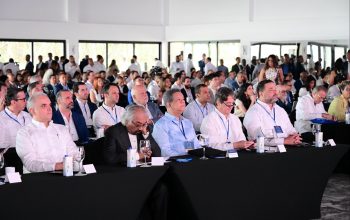news
“We Need to Ensure that Economic Development Reaches the Country’s Poorest” states GFDD Fellow Emma Fawcett during Publication Launch
August 31, 2016
GFDD Fellow Emma Fawcett was joined today by a panel of experts for the launch of the latest publication by the Fellows Program titled Challenges for Sustainable Growth through Tourism in the Dominican Republic at GFDD headquarters in Washington, D.C.
Marc Jourdan, GFDD UN Programs & Outreach Manager, gave the welcoming remarks stressing the importance of Fawcett’s study, explaining that it “offered practical
policy solutions that highlight the need for capacity building, partnership creation and the public participation of all relevant stakeholders within the Dominican tourism industry”.
He then took the floor to moderate a panel discussion on the importance of sustainable tourism for the development of the Dominican Republic.
Fawcett presented the findings of her
study highlighting key challenges that the tourism industry is facing including ensuring that “economic development reaches the country’s poorest”, “inclusive linkages to domestic suppliers” are established to ensure the development of local communities, “growth in basic services and infrastructure” are generated to keep pace with the development of the tourism industry and “basic environmental
management” is improved. She emphasized that “tourism is the oil of the Dominican Republic” to highlight the need for the government to sustainably manage this important industry. She recommended revising the incentive framework and addressing concerns of local residents, diversifying touristic products and improving environmental management through more capacity and more effective regulation of the industry.
In addition to the author,
several policy experts from the NGO community were present to contribute to the discussion, including Martha Honey, Co-founder and Executive Director of the Center for Responsible Travel and David Searby, CEO and founder of BeachCorps Volunteer Vacation.
Searby noted the incredible development opportunity that service travel, in the form of volunteer vacations, represented for the Dominican Republic. He explained that “millennials and young people with families
search for voluntourism opportunities”. Searby emphasized that the “beaches, biodiversity and culture” were key factors that made the Dominican Republic attractive to these types of service travels . He cautioned the audience that a transition to this new industry would require a change of mentality away from a culture of dependency to one focusing on “value not volume”, where the pay it forward concept is key, and “anyone
who benefits should be expected to give back”.
Finally, underscoring the position of the Caribbean as a highly climate vulnerable region, Martha Honey explained there was an “urgent need to support sustainable and environmentally responsible tourism”. Commenting on the unsustainability of the industry, she noted that while the Caribbean is the most tourism dependent region in the world, the industry brings “few benefits to
local communities”. She therefore called for “responsible travel choices” that can “make a difference fo the environment and the welfare of the people”.
Thanking the panelists for their in-depth presentations, Jourdan moderated an engaged question & answer session with the audience which touched on a variety of topics ranging from the infrastructure demands of the expanding tourism industry to selected best
practices of the Dominican tourism industry. He then concluded the event, inviting both the audience and the panelists to take part in further discussion and networking.
About Emma Fawcett
Emma Fawcett conducted her in-country field research through the Fellows Program in September of 2014. Her findings will be published in a book for the Research and Ideas Series produced by GFDD/FUNGLODE.
She holds a BA from Rutgers
University in political science and Spanish, an MS from The New School in nonprofit management and global policy, and recently completed her doctorate in international relations at the School of International Service, American University where she is now an Adjunct Professorial Lecturer. Previously, she assisted with a World Bank-funded value chain analysis of the Haitian apparel industry. Her graduate thesis focused on economic development strategies for fisher folk in the commune of
Marigot in Haiti’s Southeast department. She has also researched the impact of teacher union mobilizations on education reform in Oaxaca, Mexico. Prior to beginning doctoral studies, she worked in human resources in the private sector, as both a generalist and a recruiter.
About the Fellows Program
The Fellows Program, an extension of the internship and academic exchange program InteRDom, was developed in 2009 to respond to the
desire of GFDD and Funglode to develop a community of scholars that contributes to the Foundations’ growing body of research on matters of international concern that directly impact the Dominican Republic. The Program complements the overall mission of GFDD and Funglode to promote academic exchange, generate scholarship, and influence the creation of public policy related to economic and social development both at the national and international levels.
Through
the Fellows Program, GFDD and Funglode seek to generate scholarship on issues at the forefront of the United Nations’ agenda in order to give voice to national and regional concerns and offer viable solutions to domestic and international challenges.
Related Links:
http://www.drfellowsprogram.org/
Presentations:
Ms. Emma Fawcett, GFDD Fellow & Author
David Searby, CEO and Founder of BeachCorps Volunteer Vacation
Dr. Martha Honey, Co- Founder and Executive Director of the Center for Responsible Travel







